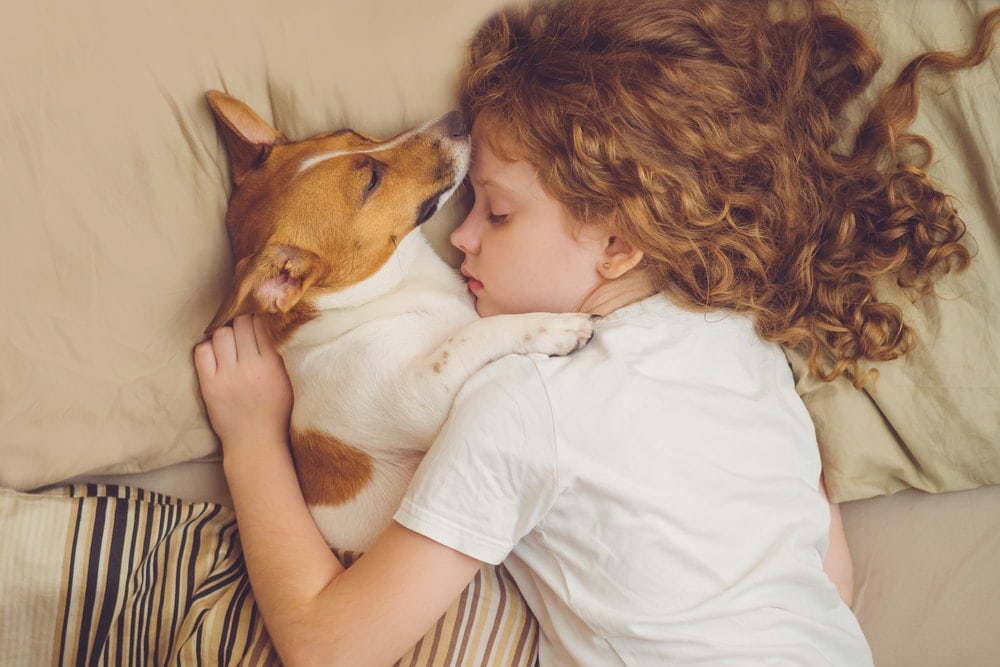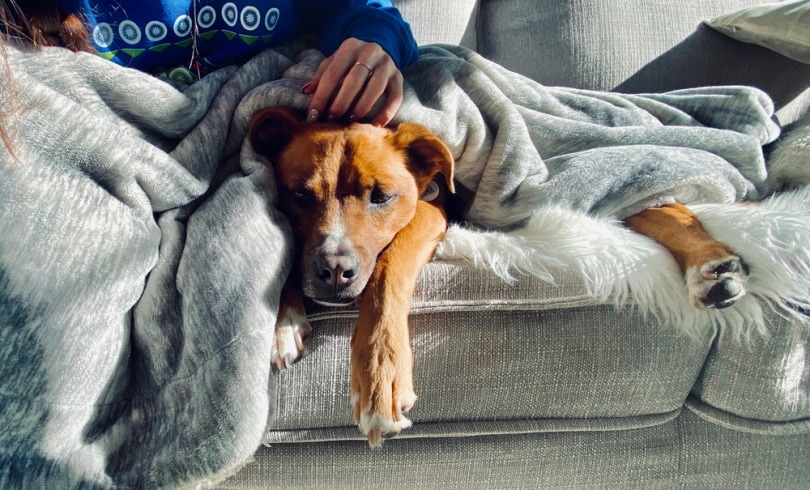In this article
View 2 More +Many pet owners treat their cats and dogs like family members, including letting pets sleep in the bed with them. So, chances are, if you’re a pet parent, you let your furry friend cuddle up to you each night when you go to bed. While not everyone allows their pets to sleep in their bed, a study by the American Academy of Sleep Medicine in 2023 found that approximately 46% of pet owners snuggle up with their pets at night.¹ That’s a lot of bed sharing with an animal that sprawls out and takes up more room than you do!
But why do people enjoy sleeping with their pets? And is sleeping with your cat or dog healthy, or are there health risks? We’ve gathered a few statistics about people sleeping with their pets and a handful of health risks you should be aware of when it comes to sleeping with a furry friend. So, keep reading to learn more!

Why Do We Enjoy Sleeping With Our Pets?
In another study2 on people sleeping with their pets, commissioned by the mattress company Sealy, it was found that 54% of pet owners allowed this because the pets were considered family. It was also discovered that 58% of people surveyed who were in relationships would rather sleep with their animals than their partner! This same study found that 47% of people letting their pets sleep with them have an easier time settling down for their night when their cat or dog is there, while 42% said having their pet in bed made them feel more secure. And 51% of pet parents stated that having their pet in bed with them at night lowered anxiety and stress.
Going back to the study done by the American Academy of Sleep Medicine, 46% of respondents said they experienced better sleep with a pet in bed. That study also found that young people are more likely to sleep with their pets than older people (53% of GenZ versus 36% of Baby Boomers).
So, severfal people sleep with their pets each night for various reasons!

Is Sleeping With Your Pet Healthy?
While sleeping with your pet provides some benefits, such as extra heat in the bed and feeling less anxious and more secure, there are also some downsides¹. First, sleeping with your pet disturbs your sleep.
One 2018 study3 discovered that people who sleep with their dogs were awakened more often throughout the night due to their dogs being active. It is not just your animal moving around while you’re sleeping that can wake you; if your pet snores, you may also wake up. Plus, if you’re a light sleeper, you’re more likely to be woken up.
Sleeping with your pets also exposes you to more allergens, parasites, viruses, and bacteria. Finally, if you’re a dog owner, sleeping with your dog increases the risk of it biting you. Some dogs get easily startled when woken up, and one study discovered that 6% of dogs¹ that bit people had been sleeping or resting right before the bite occurred. So, if your dog is a little jumpier than most, sleeping with them may not be the best idea.

Tips for Sleeping Safely With Your Pet
As you can see, sleeping with your pet has positive and negative aspects. If you decide to continue your routine of letting your pet sleep with you, there are ways to make it safer for you both.
- If you want your pet to sleep with you without disrupting your sleep, try making a cozy sleeping spot for your cat or dog by the bed. It might take them a bit of time to get used to it, but you’ll benefit in the long run while still having that sense of security that comes with having an animal nearby.
- Keep your pet clean to decrease the risk of fleas, ticks, parasites, and allergens.
- Get a mattress large enough to hold you, your pet, and anybody else sleeping in the bed. That way, every person and animal will have enough space to move around at night without disturbing one another.
- Have your pet stay on top of the blanket or comforter at all times. This will keep allergens and dirt out of your bed and ensure your pet doesn’t feel trapped.
- Wash your bedding regularly! This, along with keeping your cat or dog clean, will reduce the chances of allergens, dirt, and more getting to you.
- Consistent sleep schedules are important, but remember to factor in your cat or dog’s routine as well. For example, walk your dog each night right before going to bed to lessen the chances of them becoming overly active after bedtime.

Final Thoughts
Many pet parents sleep with their pets (nearly half!), and sleeping with your cat or dog provides some benefits, such as lowered anxiety and stress. However, you also run the risk of experiencing disrupted sleep or encountering allergens, parasites, and more by allowing your pet into bed with you. That doesn’t mean you need to stop sleeping with your pet, as there are some steps you can take to make snuggling up with your cat or dog each night a healthier experience.
So, keep your pet around at night if it makes you feel better; just do it in a way that keeps both of you happy and not sleep-deprived!
Featured Image Credit: N K, Shutterstock




















